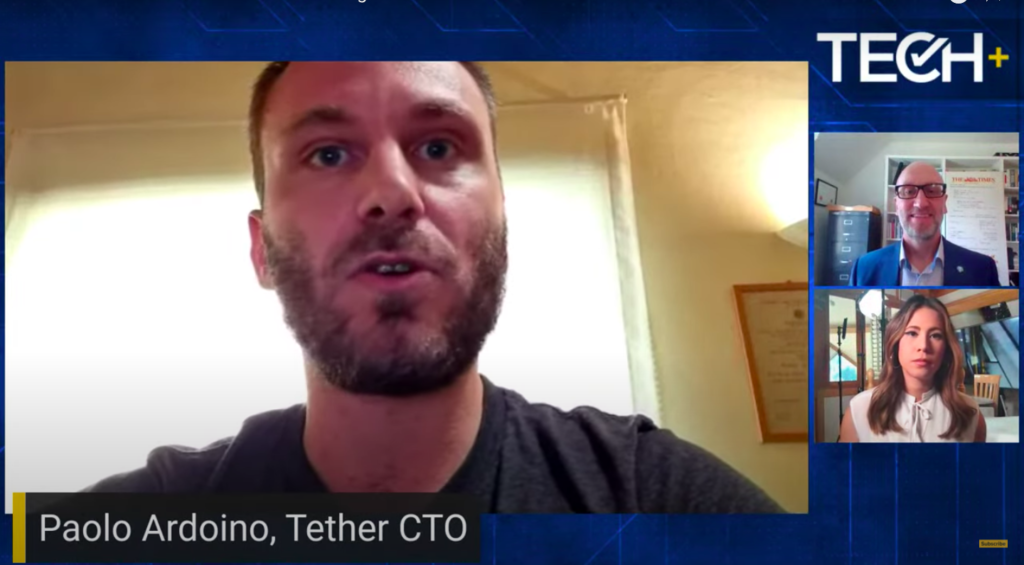Tether execs stumble through CNBC interview, say audit ‘months’ away

Two Bitfinex head honchos recently addressed persistent questions over what exactly backs their enigmatic stablecoin Tether with CNBC’s Deirdre Bosa.
The interview attracted much attention. It’s rare that either chief technology officer Paolo Ardoino or general counsel Stuart Hoegner make time for high-profile media ops, let alone together.
It went as one might expect.
The half-hour discussion touched on topics ranging from the provenance of Tether’s commercial paper to why chief exec JL van der Velde or CFO Giancarlo Devasini — the “guy who calls the shots” — are never available for interviews.

To precisely no one’s surprise, Ardoino and Hoegner offered few direct answers. Still, there’s information to be gleaned.
Tether execs confirm international commercial paper
It was a bumpy ride from the get-go. Ardoino promptly misstepped by claiming that USDT is “always redeemable” with dollars, despite Tether’s terms showing its right to delay redemptions altogether — and even redeem tokens with some other asset in its reserves.
As we know, Tether backs most of its stablecoin with commercial paper, which is similar to corporate debt (about 3% of Tether is backed by real cash in a bank).
Bosa spent a chunk of the segment clawing for clarity on the type of commercial paper giving Tether its $1 value.
The CNBC host:
- pressed for “any more details,”
- “a little bit more information,” and
- queried three times if Tether’s commercial paper was issued by Chinese companies.
Ardoino didn’t provide any relevant answers, instead: “we don’t disclose our commercial partners.”
[Read more: Inside the Great Pie Chart giving Tether its dollar value]
The two Tether execs consistently met Bosa with non-denial denials. Hoegner stated Tether was now backed “one-to-one with its reserves,” rather than one-to-one with US dollars.
At one point, Hoegner also admitted Tether’s “portfolio contains international paper” — allowing likelihood that some comes from China-based companies.
But new to the mix was his claim that the “majority” of Tether’s commercial paper (supposedly A2 and above) had been rated “across multiple [credit rating] agencies,” including S&P and Fitch.
The chat felt contentious at times. Ardoino and Bosa disagreed over the sudden stop in Tether issuances; Ardoino claimed it was due to changes in market conditions, citing less demand.
But Bosa pushed back. Competitor Circle had found traction while Tether stagnated since crypto markets corrected.
“There is less need for new Tethers, but if you are smaller it’s easier to grow faster,” said Ardoino.
The misunderstanding bled into the Twitter-sphere. Ardoino tweeted to highlight $100,000 in USDT printed that day, countering the notion that Tether issuances have halted.
[Read more: What can the Federal Reserve, Treasury, and SEC really do to Tether?]
Speaking of Tether printing, Bosa asked whether anyone “has ever had any issue redeeming Tether for US dollars?” Hoegner replied: “well, we have never refused a redemption by a Tether customer.”
Ardoino helped by harking back to a recent Financial Times article that quoted FTX billionaire Sam Bankman-Fried (one of Tether’s biggest customers) more-or-less praising Devasini for providing clients with Tether despite the criticism.
“Bankman-Fried says Devasini has ‘a lot of pride’ in what he has built at Bitfinex and Tether. ‘He’s really grateful for the people that supported him. He’s certainly fairly annoyed at people he sees as […] shitting on his businesses without real reason for it,’ wrote the FT earlier this month.
‘Head in the sand’ Hoegner
Ardoino briefly dropped out of the call. Hoegner boisterously claimed that New York Attorney General (NYAG) Letitia James made “no negative findings” about Tether in its settlement earlier this year.
Tether’s top lawyer said NYAG simply “found that [Tether] made mistakes in our disclosures about the one-to-one backing with dollars,” and those disclosures had been corrected within months.
In reality, the NYAG explicitly found Tether wasn’t always fully-backed, even though the company repeatedly claimed otherwise.
The apex of the interview was Bosa’s introduction of Tether’s long-promised-yet-delivered audit of its reserves, rather than simple attestations provided so far (the pie charts).
Hoegner assured Bosa that Tether expects a financial audit “in months, not years.” Big if true, but it wouldn’t be the first time Tether claimed audits were close.
Another strangely revealing moment: when Bosa asked why chief exec van der Velde wasn’t speaking to CNBC.
Ardoino deflected by heaping praise on both van der Velde and Devasini (they’re “great businessmen”).
Hoegner said CNBC was talking “to the people that matter,” the other two execs “don’t need the limelight,” and claimed their absence was a “matter of style” (quoting himself in the aforementioned FT article).
Really, the most delightful interaction came shortly after on Twitter.
Bloomberg’s Matt Levine and Stripe’s Patrick McKenzie wondered if Tether realized that flexing just 24-hours worth of redemption liquidity wasn’t really a flex at all.

